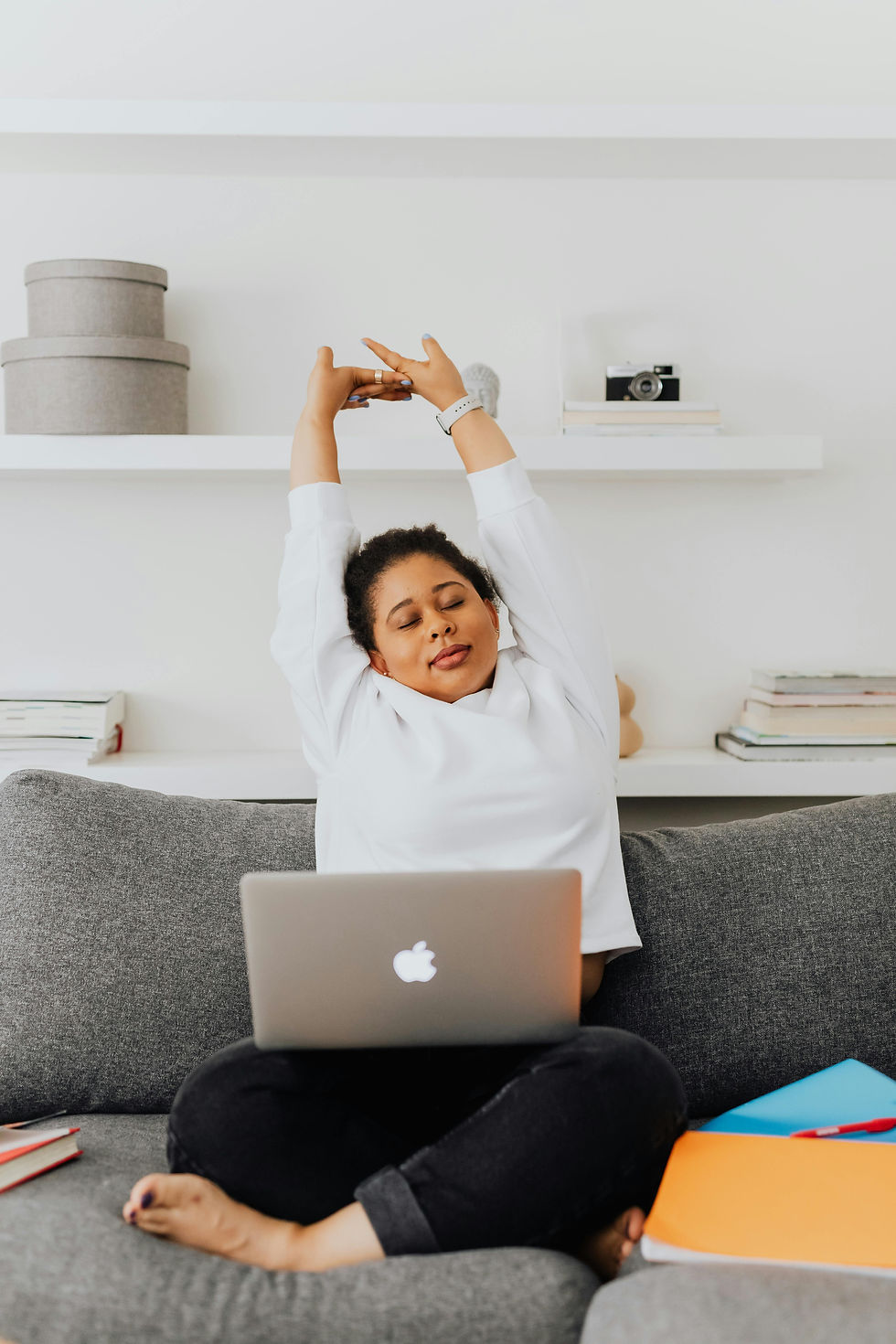Why your posture matters more than you think
- MacroMate

- Aug 5
- 5 min read

If you're reading this hunched over your phone or laptop right now, you're definitely not alone. Millions of us spend our days glued to desks, slowly but surely developing what experts are calling ‘tech neck’ and ‘computer slouch’. And while poor posture might feel like just another minor irritant of modern life, the research is clear: it's becoming a serious health concern with consequences that go beyond just looking a bit tired.
The biology behind bad posture
Before you can improve your posture, it is absolutely key to understand how your posture is formed. For instance, when you’re hunched over for hours, your muscles adapt to that shape. Your chest muscles tighten and shorten, while the muscles in your upper back get overstretched and weakened. Over time, this imbalance pulls your shoulders forward and rounds your upper spine into that classic hunched posture.
Meanwhile, your spine’s natural curves become exaggerated or flattened, which changes how your vertebrae stack and can compress the discs between them. All of this increases wear and tear on your joints and puts extra pressure on nerves, leading to stiffness, pain, and even numbness or tingling if a nerve gets pinched. Basically, your body is reshaping itself to match how you spend most of your day – for better or worse.

The hidden cost of slouching through life
Poor posture and dodgy workplace setups can seriously mess with your spine health, leading to all sorts of musculoskeletal issues and chronic problems. The numbers are pretty shocking: people are sitting for an average of more than 9 hours per day. That's more time than most of us spend sleeping.
When we're stuck in poor posture for hours on end, our bodies start paying the price in ways you might not expect:
Your muscles and joints take a beating: Slouching puts crazy amounts of strain on your spine, which leads to chronic back and neck pain. That forward head position so many desk workers develop? It can put up to 60 pounds of stress on your neck – that's literally like carrying a bowling ball around on your shoulders all day.
Your circulation gets sluggish: Poor posture squashes blood vessels and restricts circulation, leaving you feeling tired and foggy. Your brain needs good blood flow to do its thing properly.
Your breathing gets shallow: Hunched shoulders and a collapsed chest can reduce your lung capacity by up to 30%, which means less oxygen getting where it needs to go. Hello, afternoon energy crash.
Your digestion suffers: Slouching compresses your internal organs, potentially messing with digestion and contributing to things like acid reflux.
Why posture matters a great deal
Research has found that shoulder pain, mid back pain, and low back pain were all relieved with exercise programs for posture correction.
Another interesting fact: when workers have access to adjustable workstations, they naturally choose to switch to standing for about 47 minutes on average once a day. It seems our bodies instinctively know we need to mix things up – we just need to give ourselves the option.

Practical ways to fix your posture
Sort out your workspace
Your environment plays a huge role in how you hold yourself. Adjust your monitor so it's at eye level, make sure your feet can rest flat on the floor, and position your keyboard and mouse at elbow height. Check out this visual guide to make your workspace more comfortable – it's honestly a game-changer.
Consider a sit-stand desk
Alternating between sitting and standing throughout the day can reduce the static load on your spine and improve circulation. Start with short standing intervals and gradually build up – don't try to stand for hours straight on day one.
Follow the 20-20-20 rule
Every 20 minutes, look at something 20 feet away for at least 20 seconds. This simple trick breaks the cycle of that forward head posture and gives your eyes a rest from screen glare. Set a phone reminder if you need to – your neck will thank you.
Move more
Prolonged sitting is a major risk to our health, so regular movement is non-negotiable. Set hourly reminders to stand up, stretch, or take a quick walk around the office. Even just two minutes of movement can reset your posture and give you an energy boost.
Strengthen your core
A strong core supports good posture. Simple exercises like planks, bird dogs, and dead bugs can be done at home and will make a real difference to your postural stability.
Practice posture awareness
Start checking in with your posture regularly when you're sitting, standing and walking. At first, you could set an alarm for every 30 minutes as a reminder to assess and correct your position. It feels a bit annoying at first, but it becomes second nature pretty quickly.

Simple moves for desk warriors
Neck stretches: Gently tilt your head to each side, holding for 15-30 seconds to counteract that forward head posture.
Shoulder blade squeezes: Pull your shoulder blades together and hold for 5 seconds to combat rounded shoulders.
Hip flexor stretches: Step into a lunge position to stretch those tight hip flexors that come from sitting all day.
Thoracic spine extension: Place your hands behind your head and gently arch backward to open up your chest and counteract hunching.
For more specific exercises, check out these ten tips for improving posture and ergonomics.
Making it stick (without driving yourself crazy)
The key to better posture isn't about being perfect – it's about being consistent and aware. Start with just one or two changes and gradually build the habits. There are loads of posture apps and wearable devices that can give you gentle nudges throughout the day if that's your thing.
Your body adapts to whatever positions you spend the most time in. By making small, consistent changes to your work habits and incorporating regular movement and strengthening exercises, it is possible to reverse bad posture and significantly improve your long-term health.
A little self-reflection goes a long way
One thing that can be really powerful is paying attention to how different positions and movements make you feel. Notice when your back starts aching, or when you feel most energised and alert. Your body is constantly sending you signals – you just need to give yourself the space to tune in and listen.
Good posture isn't just about looking more confident (though that's a nice bonus) – it's an investment in your physical health, mental clarity and overall quality of life. The changes you make today will pay dividends for years to come, and your future self will be pretty grateful.



Comments